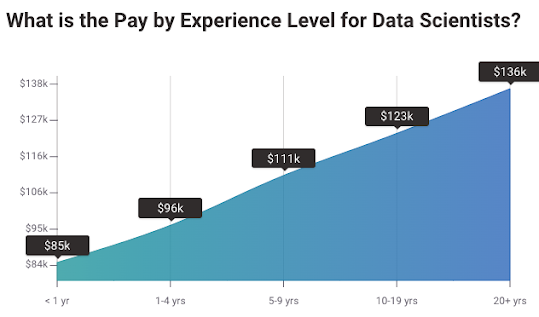Everything you need to know about Data Science.
SECOND BLOG
Hello friends. I hope you're doing well. In this blog, we will look at what data science is and address frequently asked questions about various parts of data science. This is the field you heard a lot about. Right now, isn't it the best time to know more about it? If you are ready, let's start.
Data science is everywhere right now. Companies all over the world are using data science one after the other to address the world's most varied issues. You may have a question.
What is Data Science?
Data science is a multidisciplinary field that integrates scientific ideas, analytical tools, and statistical algorithms to produce valuable insights and discover hidden patterns in data. It involves a variety of fields such as mathematics, statistics, programming, visualization, IT infrastructure, and data engineering. The main objective is to find the answer to business problems. I hope you've gained some insight into this field. I suggest you read the next paragraph for a better understanding.
What are some industry examples of data science?
The beauty of data science is that it can be used in any kind of industry. Now, I will give some examples of successful data science projects that are used in distinct industries. In financial services, Bank of America created a financial assistant chatbot that allows clients to accomplish things like searching for transactions and getting balance information more effectively. In sports, to boost on-field performance, English Premier League teams are leveraging data and technical analysis such as optical tracking. Moreover, in marketing, Nike uses predictive analytics to increase customer acquisition and retention by identifying and targeting the right consumers. After all, if you want to see more examples of it, I put a picture on my Telegram blog post.
Who is Data Scientist and what does he/she do?
A data scientist is a specialist who specializes in data analysis and interpretation. They apply their data science expertise to assist firms in making better decisions and improving their operations. Data scientists are often well-versed in mathematics, statistics, and computer science. They apply this understanding to examine massive data sets in order to identify trends or patterns. Similarly, I want to mention that there are different types of roles in the data science domain. You will have more information if you click this link and read about their roles and responsibilities.
What Qualifications and Skills Do Data Scientists Require?
There are some discussions about whether a degree is required to become a data scientist. Many experts have entered the field through alternative ways, but a university degree can be worthwhile. As for their skills, data scientists should have good analytical skills to find solutions to problems efficiently, as well as technical skills such as coding, data modeling, and so on. Below, I am sharing the skills they need to have.
Hard skills:
To be a fully developed data scientist, you should have these technical skills.
- Python and R
- Statistics and math
- Data visualization
- SQL and NoSQL
- Machine learning and deep learning
- Big data and Cloud computing
- Natural language processing
Soft skills:
These are the "power skills" needed to be a good data scientist.
- Storytelling
- Communication
- Teamwork
- Business issues
- Critical thinking
- Problem-solving
If you pay more attention to the last sentence of each paragraph, you will find links to more information about a specific topic, which will redirect you to trustworthy websites. In short, I am also giving you an article called "The Top 15 Data Scientist Skills" in more detail here.
Are You Interested in Data Science Salary?
Data science salaries are different due to a variety of factors like experience, company size, skills, and the like. I want to sum up things briefly.
According to Payscale data, if you are an entry-level data scientist looking for your first job, you can expect an average salary of $85,000. With 1-4 years of experience, you can expect a compensation of $96,000 while with 5-9 years of experience, you can expect an average salary of $111,000. When you reach seniority, you can earn more than $130,000.
If you want to know more about salaries in terms of other factors like company size, skills, and location, I recommend reading this article.
Summarizing the final conclusion.
For the foreseeable future, data will be the lifeblood of the commercial world. Data is actionable knowledge that can spell the difference between a company's success and failure. Companies may now estimate future growth, predict potential challenges, and design informed success strategies by incorporating data science techniques into their operations. Do you have a strong interest in this field? Now is an excellent moment to begin your career in data science.
Do you have any questions or suggestions about this 'Everything you need to know about Data Science.' blog post? If so, feel free to comment below.
Need more?
Data Science from Scratch - link
How to Become a Data Scientist - link
Data science roadmap in Uzbek - link
Credits
I would like to express my appreciation to the websites datacamp.com and simplilearn.com for providing real facts, explanations, and materials about data science.



Wow, very nice, interesting and informative blog about Data Science. Everything about this profession is explained in great detail. 👍 I've read this blog till the end now I have a clear insight about Data Scientists) I like the fact they use Python and R as main tool for analytics and statistics.
ReplyDeleteAppreciate it.
DeleteNice blog, Mehrol
ReplyDeleteThank you
DeleteTo be honest, I am not interested in data science but your post was informative enough. I guess, that someone, who have never heard about this field but have some skills, after reading your post will realy think about studying or serching deeper in this field.
ReplyDeleteThank you a lot for your inspirational words. It really pushes me to learn my field deeper.
Delete